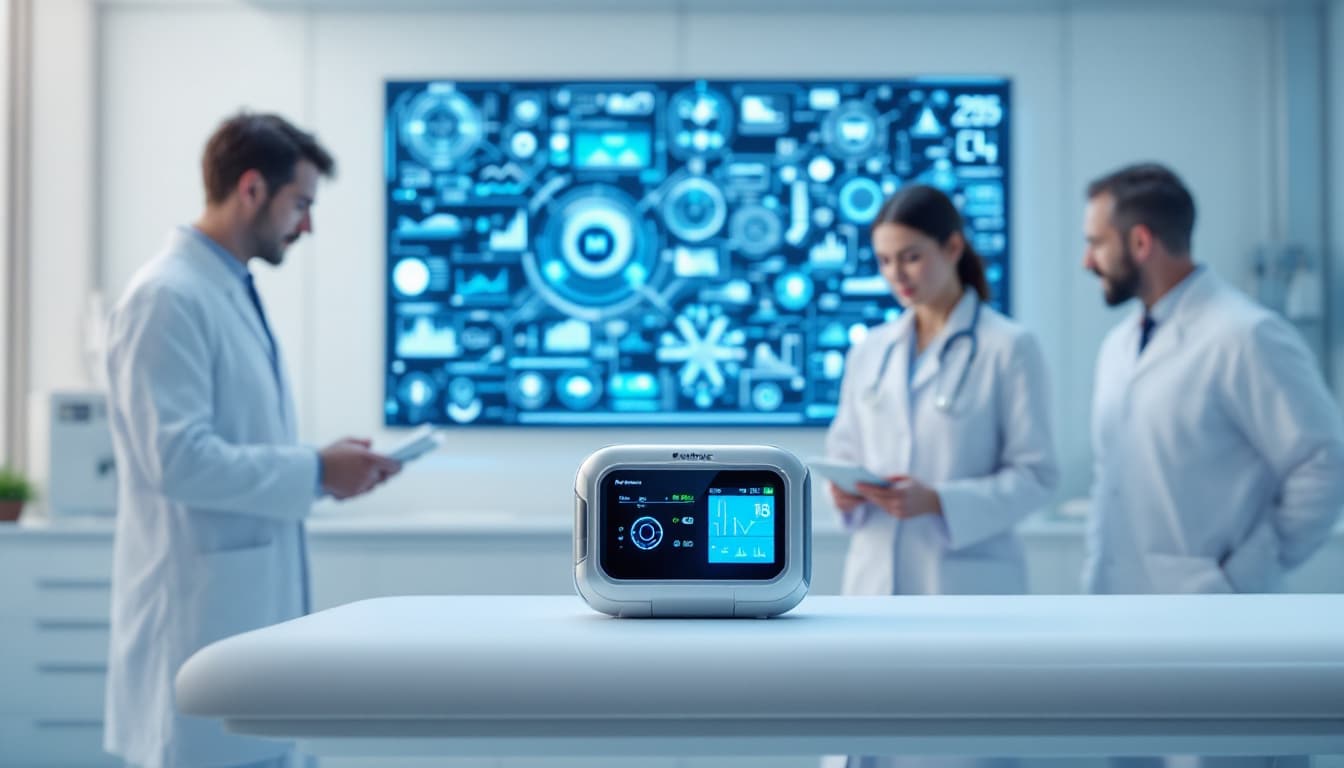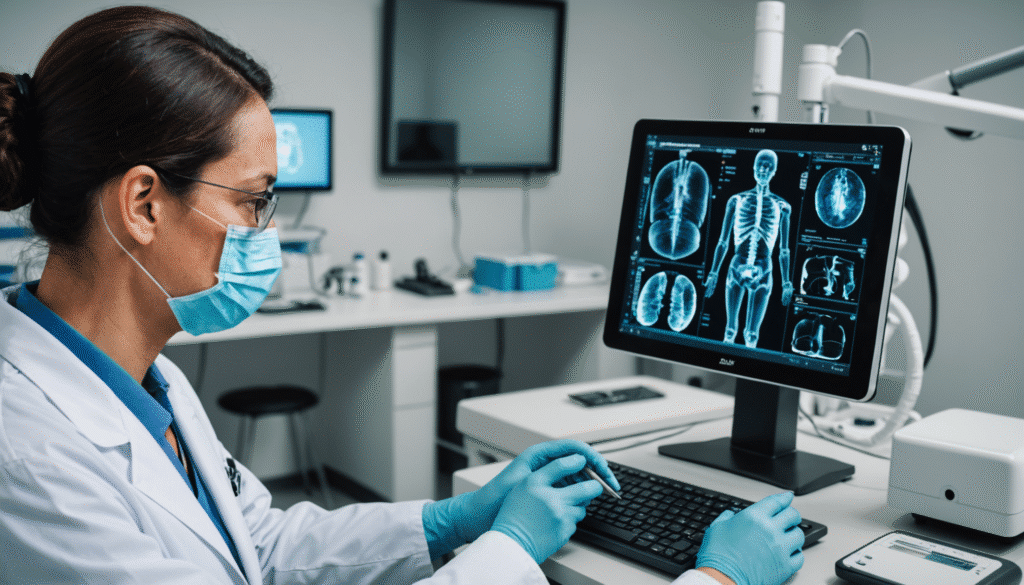Innovations in the medical field continue to amaze. Medtronic, a pioneer in diabetes technologies, is at the forefront. The company is currently seeking approval from the Food and Drug Administration for an interoperable version of its latest insulin pump.
This initiative marks a significant step in collaboration with its technological rival Abbott. By submitting two distinct applications, Medtronic aims to enhance the efficiency of its automated insulin delivery systems. The integration of Abbott’s glucose sensors will allow for real-time dose adjustments, thus providing a more personalized and responsive solution for patients.

In the realm of medical technologies, Medtronic stands out once again by seeking approval from the FDA for its latest insulin pump. This step marks a crucial stage in the strategic collaboration with Abbott, a major competitor in diabetes technology. Through this initiative, Medtronic aims to provide a more integrated and effective solution for diabetes management, thereby improving the quality of life for patients.
What are the details of Medtronic’s 510(k) submissions to the FDA?
Last Thursday, Medtronic announced that it has submitted two 510(k) applications to the FDA. The first concerns the MiniMed 780G, an insulin pump presented as an alternative controller device. The second relates to the SmartGuard insulin dosing algorithm, designed as an automated and interoperable glycemic controller. These applications aim to obtain the necessary validation to integrate Medtronic‘s technology into automated insulin delivery systems capable of real-time dosing adjustments based on glucose monitor data.
This advancement allows the use of components made by different companies, thus enhancing the interoperability of medical devices. By positioning itself as a facilitating player, Medtronic paves the way for better collaboration among manufacturers and offers more flexible and tailored solutions to meet patients’ needs.
How is the collaboration with Abbott transforming the diabetes market?
The collaboration between Medtronic and Abbott represents a significant turning point in the diabetes technology sector. Abbott, a market leader in continuous glucose monitors (CGM), has already established partnerships with several insulin pump manufacturers, such as Insulet, Tandem Diabetes Care, and Beta Bionics. This new cooperation with Medtronic enables the creation of an integrated ecosystem where the technologies of both companies complement each other perfectly.
According to Que Dallara, president of the diabetes division at Medtronic, this collaboration “marks an important advance in providing innovative solutions and offers more choices to our customers.” This means that diabetic patients will be able to benefit from a more coherent and effective glucose management system, combining the best technologies available on the market.
Furthermore, last year, the two companies concluded an exclusive agreement allowing Abbott to manufacture glucose sensors compatible only with Medtronic‘s insulin pumps and pens. Although the terms of this partnership have not been disclosed, it is clear that this synergy directly benefits end users by providing more harmonious and integrated therapeutic solutions.
What is the impact on patients with diabetes?
The integration of Medtronic and Abbott‘s technologies promises a significant improvement in the management of diabetes. Automated insulin delivery systems, capable of adjusting dosage based on real-time readings from glucose monitors, offer patients a more precise and personalized management of their condition. This can reduce the risks of hypoglycemia and hyperglycemia while simplifying users’ daily routines.
With the recent approval from the FDA for the Simplera Sync sensor used with the MiniMed 780G, Medtronic further strengthens its market position. This combination is part of an automated insulin delivery (AID) system, which represents one of the most promising advances in the treatment of type 1 and type 2 diabetes. Patients will thus benefit from integrated technology that reduces the burden of daily management while optimizing glycemic control.
In addition, increased access to devices compatible with different brands of glucose monitors and insulin pumps offers greater flexibility to patients, allowing them to choose the solutions that best meet their individual needs.
How does Medtronic position itself against its competitors?
The diabetes technology market is becoming increasingly competitive, with companies like Tandem Diabetes Care, Beta Bionics, and others constantly innovating to capture market share. The recent collaboration between Medtronic and Abbott allows them to position themselves advantageously against these competitors. By offering an interoperable solution, Medtronic differentiates itself by providing products compatible with other technologies, in contrast to its previous strategy of matching only its own devices.
Moreover, significant investments in R&D projects and strategic partnerships, such as the IPO of Beta Bionics which raised $204 million (source), demonstrate the intensity of competition in this sector. Medtronic will need to continue innovating and strengthening its collaborations to maintain its leadership position.
Additionally, the FDA‘s approval of competing technologies, such as insulin pumps from Tandem for type 2 diabetes (source), underscores the importance for Medtronic to stay at the forefront of innovation and to address the evolving needs of patients.
What are the future prospects for Medtronic and Abbott in this partnership?
The partnership between Medtronic and Abbott opens the door to many opportunities for both companies. By combining their respective expertise, they can develop even more advanced and integrated solutions for diabetes management. This collaboration could also encourage other companies in the sector to adopt similar approaches, thus promoting greater interoperability of medical devices.
Furthermore, Medtronic continues to develop its own continuous glucose monitors, with new innovations on the verge of being launched. The recent approval for the Simplera Sync indicates Medtronic‘s desire to remain competitive and to offer high-quality products in the market. Meanwhile, Abbott benefits from exclusive access to Medtronic‘s insulin delivery technologies, thus strengthening its dominant position in the area of CGM.
Financially, Medtronic continues to perform well, as demonstrated by recent financial results recorded with Baxter and Insulet (source). This illustrates the strength of their strategy and their ability to invest in profitable partnerships. In the future, we can expect to see Medtronic and Abbott exploring new technological avenues, perhaps integrating artificial intelligence or telemedicine capabilities to offer even more personalized and responsive solutions.
Moreover, investors are showing increasing interest in the medical technology sector, as highlighted by recommendations to watch certain Medtech stocks in January for investment opportunities (source). This economic dynamism could facilitate further collaborations and innovations in this critical field.
What benefits for investors and the medical market?
The initiative of Medtronic to seek approval from the FDA for an interoperable insulin pump, in collaboration with Abbott, has positive repercussions not only for patients but also for investors and the medical market in general. This innovation strengthens Medtronic‘s position in the market, thereby attracting the attention of investors interested in cutting-edge medical technologies. Investments in this field are supported by the promise of innovative products and the continuous growth of the diabetes sector.
Furthermore, this collaboration could trigger increased competition, pushing other companies to innovate and offer even more effective solutions. In market terms, better integration of medical devices could lead to quicker adoption of advanced technologies, ultimately improving care standards for diabetic patients.
In summary, Medtronic‘s initiative and its collaboration with Abbott represent a significant advance in diabetes treatment. This initiative promises not only to improve the quality of life for patients but also to invigorate the medical technology sector by encouraging innovation and competition. The benefits will extend both to end users and to investors, making this collaboration a key element to watch in the coming years.
To learn more about recent developments in the sector, check out the following articles:
- Beta Bionics raises $204 million in its IPO
- Tandem’s insulin pump technology receives FDA approval for type 2 diabetes
- Baxter, Medtronic, and Insulet close out the earnings season in the medical technology sector
- Two Medtech stocks to watch in January: investment opportunities to seize
- Tandem’s insulin pump technology receives FDA approval for type 2 diabetes (EN)













